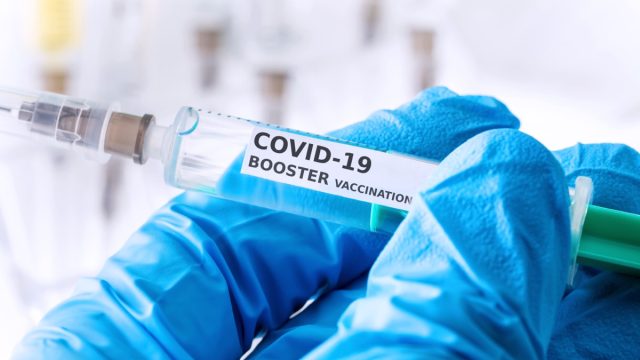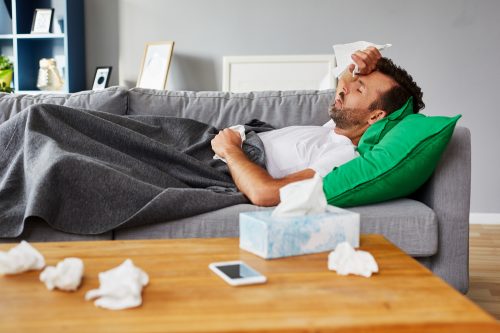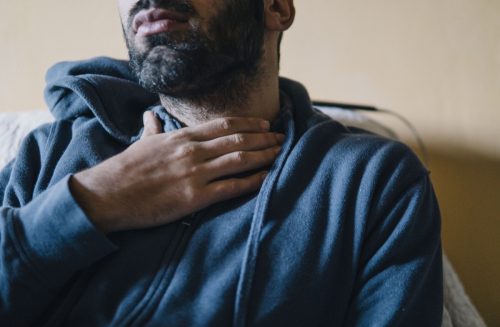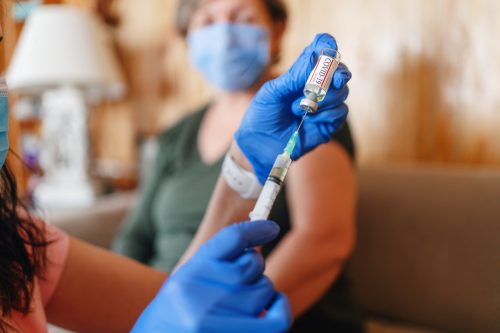Doctor Reveals COVID Symptoms in Patients Who Haven’t Gotten a Fall Booster

COVID-19 symptoms have always been somewhat confusing. Since the virus first spread widely in 2020, telltale signs have shifted and differed from patient to patient—and this fall’s cases show similar variation. While we’re fully immersed in cold and flu season, COVID is again rearing its ugly head, with doctors saying that symptoms are different for those who haven’t yet received the fall booster. Read on to find out what patients are reporting.
RELATED: COVID Symptoms Now Follow a Distinct Pattern, Doctors Report.
Patients without the booster have lingering symptoms, doctor says.

In conversation with NBC Chicago, Chantel Tinfang, MD, family medicine practitioner with Sengstacke Health Center at Provident Hospital of Cook County, noted that symptoms are presenting differently in patients she’s treated without the latest booster.
Even if vaccinated or boosted a year ago, these patients are “still experiencing symptoms, and they get really sick,” Tinfang told the outlet.
“I have prescribed medication over the past few weeks to treat some patients because they were not really getting better after staying home,” she added.
According to Tinfang, sore throat, fatigue, decreased appetite, and overall feelings of being sick and unwell are the symptoms she sees persisting in this patient population.
RELATED: The Most Accurate Time to Take a COVID Test, New Study Reveals.
When COVID symptoms don’t go away, treatment is often required.

Tinfang told NBC Chicago that when more intense symptoms persist, that’s when an intervention is needed—even if it’s not “long COVID.”
She explained, “Sometimes the symptoms can linger, and that’s a sign that we need to actually act,” noting that some people do eventually get better with rest and fluid intake.
If you find yourself in this situation and your symptoms don’t improve after the five-day isolation period, Tinfang recommends calling your doctor.
RELATED: 10 Places Bringing Back Mask Mandates Right Now.
Doctors have observed a different symptom pattern, too.

Earlier this year, doctors pointed out that in general, they were seeing a new pattern for COVID symptoms, which differed from what was seen at the onset of the pandemic.
As doctors told NBC News in August, the virus was mainly affecting the upper respiratory system, starting with a sore throat before congestion set in, along with fatigue, aches, fever, chills, headache, and post-nasal drip.
One of the symptoms most commonly associated with COVID—loss of taste and smell—was seen much less frequently, Grace McComsey, MD, vice dean for clinical and translational research at Case Western University, told NBC News, noting that, at the time, she was only seeing this in about 10 to 20 percent of her patients.
The CDC still recommends shots, but few are getting them.

In terms of vaccination, the Centers for Disease Control and Prevention (CDC) recommends that people stay up to date with vaccines “to protect against serious illness from COVID-19.” The booster that’s currently available has been updated to target a new COVID variant, XBB.1.5, a descendant of Omicron, the Associated Press (AP) reported. Last month, when it became available, the CDC recommended everyone six months and older get the booster.
Despite these recommendations, as of Oct. 14, only 7 percent of adults and 2 percent of children had received the latest vaccines, per a survey presented to the CDC. One expert said the numbers were “abysmal,” AP reported, with nearly 40 percent of adults saying that they probably or definitely won’t get the shot. A similar percentage of respondents said they don’t plan to get the booster for their children, either.
RELATED: For more up-to-date information, sign up for our daily newsletter.
Best Life offers the most up-to-date information from top experts, new research, and health agencies, but our content is not meant to be a substitute for professional guidance. When it comes to the medication you’re taking or any other health questions you have, always consult your healthcare provider directly.